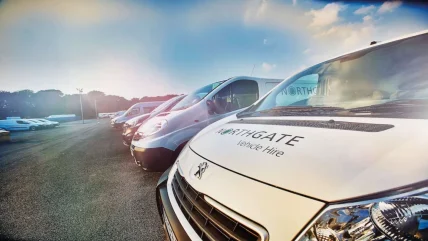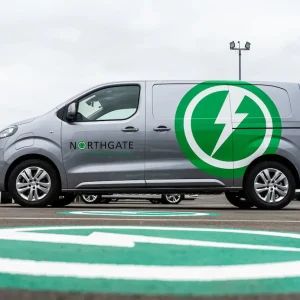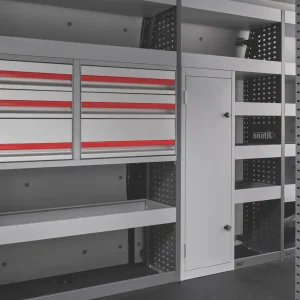
JD: What are the main changes you foresee in the van rental business during the coming years?
NM: Currently, for reasons we all understand, the economic outlook is unclear. The lack of a clear way forward for the UK has reduced investment levels, which in turn has reduced levels of commercial activity. However, at some point the uncertainty will end. Businesses will find a way of managing and prospering in whatever new economic framework we are operating within. As UK Plc gets back to work, we anticipate demand levels will grow as investment recovers and businesses seek growth.
Undoubtedly, we will see further growth of low-emission and clean-air zones across the country, forcing businesses to renew their fleets with cleaner, compliant vehicles. As technology continues to develop, van operators will become more confident in electric vehicles and other alternative fuels. Fleet providers need to keep a close eye on this shift to make sure they are prepared to cater to this demand.
We see customers increasingly seeking integrated solutions across their commercial fleets. There are several methods by which fleets can access commercial vehicles and our product range competes across the spectrum.
From understanding the task to specifying and supplying the most suitable vehicles, through every step of in-life servicing and management to vehicle renewal, our aim is to be with customers throughout the journey, providing advice based on our vast experience and support through our market-leading network of depots and inhouse workshops. Customers no longer want to be just provided with vehicles – of course, the vehicle matters – but the real value is in the expert knowledge and support services through all steps of the customer’s use of the vehicles.
Are more businesses turning to hiring LCVs rather than outright purchase to avoid the potential hazard of depreciation?
For many years, we have been advocating the move away from van ownership to more flexible models, such as vehicle hire. Our Vanonomics research last year showed that four out of five businesses in the UK own their vans, so many commercial vehicles in the UK are still owned. However, this is beginning to change and depreciation on its own is not the sole reason.
The current uncertain economic outlook, ever-changing legislation and increasing environmental requirements are convincing van operators that flexibility is the key to achieve business goals. In effect, this means that operators are starting to consider the financial, operational and environmental benefits of using newer LCVs on a flexible-hire product, or a blend of flex and minimum-term rentals. While avoiding the potential risk of vehicle depreciation is one of the benefits, vehicle hire appeals to businesses for many other reasons, whether that is avoiding emission charges, freeing up capital for investment, increasing flexibility or minimising downtime.
Is rental a better solution than leasing? If so, why?
Both rental and leasing solutions have their pros and cons. In the LCV market, forecasting the costs associated with a fleet involves many variables that make it difficult to pin down future requirements.
However, both underestimating and overestimating these requirements could have a very significant impact on the business and its agility. Here is where rental trumps lease as it allows a great degree of flexibility.
Flexible rental solutions enable businesses to scale up or down when they need to so that they can match their changing requirements. Many customers manage their resources around seasonal demand and we give them the option to add on more vehicles during their peak season and return them when they are no longer needed. Consequently, vehicles are not a burden on resources and businesses can be more responsive to current trends.
From what industries do most Northgate customers come?
Our hire products are suitable for a wide range of industries and we don’t target any one particular industry. Overall, most of our customers operate in the public sector, logistics, utilities, and construction industries.
Are they mainly big fleets or SMEs?
We provide vehicles and services to literally one man and his van right up to the largest users of LCVs in the country and everything in between. Vans really matter to customers, and whether you have one van or 1,000 vans you need to source them competitively, and then get them on the road and operating efficiently.
With the recent addition of 25 Nissan eNV200s to your fleet, do you see this part of the business growing?
Absolutely. The appetite for EVs is growing, although the LCV sector is lagging behind personal cars. The technology for commercial vehicles is still in its early stages and supporting infrastructure is lacking – however, we can now begin to help early adopters reap the benefits of electric vans.
Last-mile delivery companies and those operating in densely populated urban areas, are particularly well-suited to test out the first electric vans. The charging infrastructure is growing at a rapid rate within their vicinity, allowing them to enjoy the much lower running costs of EVs.
At this stage, going electric requires significant investment, so the opportunity to rent EVs to assess without risk how these vehicles would fit in an existing fleet enables companies to make smart business decisions. To accommodate future demand, we are working closely with manufacturers on customer requirements to support the development of the technology. We are also training our technical teams and support service staff to ensure they are prepared for the opportunities this technology will bring.
Are you moving towards a digital business model in dealing with customers?
Digital engagement is the driving force for staying relevant in the future. Our customers already benefit from a multi-million-pound investment in our cloud-based ERP & IT infrastructure to offer personalised engagement through data-driven, digital self-service operations. We aim to offer our customers the same convenience they are used to in their personal lives with smart technology – we have already identified further areas for future development of our product portfolio to bring the van hire sector into the 21st century.
What services should vehicle hire companies offer to deliver holistic packages to their customers?
Customers are looking for fleet management services. Ideally, these services should cover all aspects of selecting, specifying, operating and returning hired vehicles. This cradle-to-grave service will help fleet operators identify efficiencies and cost savings, access expert insight as well as offer them greater visibility of their fleets and deliver personalised reporting.
Being a holistic provider means listening to customers’ needs and introducing new solutions that address the challenges they face. It starts with consultancy on the most suitable vehicles and hire products and continues throughout the partnership to ensure the most efficient use of the fleet. This, of course, includes the traditional extras, such as maintenance and replacement vehicles, but also extends to more bespoke solutions that leverage telematics and driver apps. Any solution that helps our customers operate more efficiently and with minimal risk is desirable, whether that is vehicle insurance, fuel cards or damage allowance.
How does Northgate show new customers it can meet their requirements?
We use our extensive experience in the industry to define new products that help van operators achieve their business goals and we don’t shy away from bespoke solutions where required. The hire sector hasn’t always had a great reputation and many businesses are worried about ‘hidden’ costs, so we make sure our pricing is transparent from the very start.
We introduced 28-day billing, along with daily rates, to make processing easier for customers. This results in improved accuracy in their billing and helps forecasting. We do not ask our minimum-term or flexible customers to pay a deposit. Neither are there any hidden or unexpected costs. Our bespoke packages can be tailored to a great level of detail and allow customers to remain flexible with how many vans they rent and how often they need to do so.





